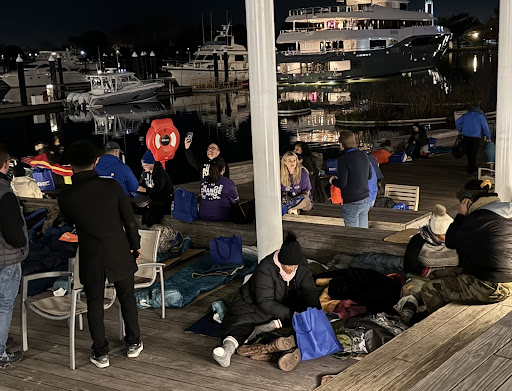How is a D.C. homeless shelter like General Motors? Both might need a complete overhaul to stay afloat in the current economic crisis.
From Virginia to Maryland, homeless services are feeling the economic squeeze in two places: decreased donations from cash-strapped citizens and a spike in food and shelter requests. Some nonprofits are even seeing former donors line up at soup kitchens or food pantries, this time with their hands out.
There is a nonprofit crisis brewing: Organizations that lack a diverse number of funding sources ~ those that rely primary on government grants, for example ~ may not be able to survive the more difficult times ahead. Up to 30% of all nonprofit organizations in the greater D.C. area may up and disappear in the near future, according to analysts at the Nonprofit Finance Fund. They call the phenomenon “compressing the sector.”
A March 2009 report by the Washington Regional Association of Grantmakers saw givers in a weakened position ~ 86% of respondents announced a decrease in assets. More than 50% of foundations reduced their own giving budgets. On top of this, a survey of nonprofits showed that nearly one-in-three had a salary freeze in effect, while 13% had laid off staff. And all the while, requests for funds have gone through the roof.
Glen O’Gilvie, CEO at the Center for Nonprofit Advancement, said that one-third of the nonprofits in the area have cut programs, including homeless shelters and other providers. He said organizations are making staff take unpaid furloughs, mandatory vacations and layoffs. To make matters worse, the end is nowhere in sight.
These challenges come at a time when social service needs are at an all-time high.

Thrive DC, an agency in Northwest D.C. that offers meals, laundry services, beds and job training, says they have been serving an additional 1,000 meals a month. At the same time, foundation giving and individual donations have dropped 20%.
“Many of the individuals we serve are used to being marginalized, forgotten, or having their trust broken, and I think they worry or assume that their needs will again fall to the bottom of community and policy priorities,” said Erika Barry, Thrive DC’s executive director.
So Others Might Eat, a group that provides food, elder services and other programs, has seen an 8% increase in meals served in just the last two months. They now serve about 800 people a day, many of whom have “jobs, suits, construction uniforms, and ID badges,” according to spokeswoman Tracy Monson.
Monson said that while foundations are “sticking with us. it’s impossible for them to support us like in the past.”
Some social service agencies and nonprofit leaders are calling for a “paradigm shift” to keep their own organizations in operation.
Robert Egger, founder of DC Central Kitchen, said that nonprofits are “trapped in a fundraising cycle” where directors spend more and more time fighting for dollars and “everyone is out for themselves.” He calls this self-preservation “the Achilles’ heel of the nonprofit sector.
“We have a large number of organizations… many duplicating services,” said Egger.
The other issue is the financial instability of many social service agencies. Homeless organizations that have only one or two sources of income “are very vulnerable… and, sadly, [are] very common,” said Garvester “Gar” Kelley, vice president for the Mid-Atlantic Region at the Nonprofit Finance Fund. For the time being, governmental funding for D.C.’s homeless efforts seems to be stable. A spokeswoman from the Department of Human Services that she didn’t foresee cuts to homeless services in the D.C. area next year. While there will be “necessary budget reductions” in the 2010 budget, she said care will be taken so these cuts will happen “without reducing homelessness services to residents.”
Personal donations to nonprofits, however, are unpredictable and can change extremely quickly. Nonprofits received two warning signs that their service model was shaky~ 9/11 and Hurricane Katrina. While people panicked, nonprofits that weren’t the cause célèbre suffered.
“The people who didn’t have diverse funding streams… they really felt it,” said O’Gilvie at the Center for Nonprofit Advancement. He said some organizations have spent “some or all of their reserves” and one A February 2009 survey of nonprofits across the region revealed that 46% of respondents had not met their fund-raising goals through December of 2008.
O’Gilvie says his organization is trying to provide some new models for the service providers of the future. The key, he says, is cooperation: a group of 830 nonprofits have already banded together to leverage their buying power when purchasing retirement plans and health insurance. Now, he is trying to create “shared back-office services” where accounting, bookkeeping and human resources can be centralized at a significant savings.
“The sector needs to evolve,” said Egger, who also co-founded the Nonprofit Congress, a strategic planning group for nonprofits.
“We’ve got the biggest pot of untaxed revenue in the U.S…. [Politicians] are coming for us.”
Egger said that people need to wake up to this new reality, and fast. In the 1980s, he said, homelessness was en vogue. More recently, he said, “large scale fundraisers have shifted to AIDS… and now breast cancer.”
“The era in which we can be service providers has passed. We should be developers. I need to become an employer.”
That’s exactly what Egger did. Rather than teach low-income people job skills and hope someone will hire them, Egger created a culinary job training program to train his clients as chefs and caterers, whom he then employs. He makes a good deal of revenue from the business, which lessens his need for outside resources.
And his employees? They get $12 an hour and health benefits.
The Nonprofit Finance Fund’s Gar Kelley said while innovation is important, collaboration will be the saving grace at the end of the day. And sometimes this means stopping turf wars over funding and joining forces.
“The number of organizations will be reduced,” he said plainly.
“The fundamental question is not ‘Will my organization survive?’, but ‘Will the people my organization was established to serve continue to be served?’ ”







